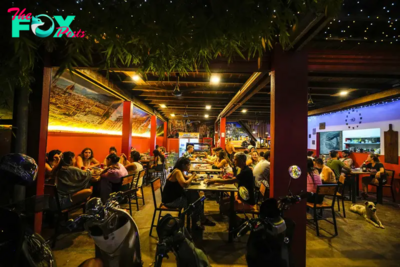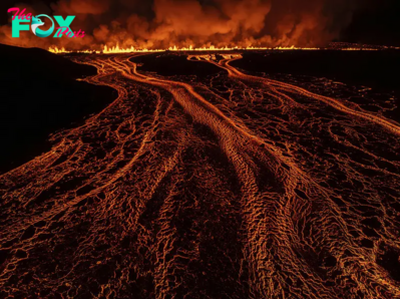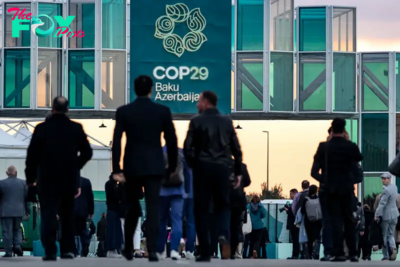World News
An Iceland Volcano Erupts Again But Spares the Nearby Town of Grindavik For Now
GRINDAVIK, Iceland — A volcano in southwestern Iceland erupted Thursday evening for the sixth time since December, spewing red lava through a new fissure on the Reykjanes Peninsula.
The eruption began shortly after 9 p.m. following a series of strong earthquakes and within the hour a 4-kilometer (2.4-mile) fissure cut through the Sundhnúkur crater.
Iceland authorities say the eruption’s effects remain localized with road closures but do not threaten the population.
Halldór Björnsson, head of weather and climate at the Norwegian Meteorological Agency, told the Icelandic news portal Vísir, that unlike previous eruptions, the lava flow is not heading for the town of Grindavik that was largely evacuated in December when the volcano came to life after being dormant for 800 years.
Magnús Tuma Guðmundsson, a geophysicist, who flew over the eruption centers this evening told the website that “if this continues like this, Grindavík is not in danger because of this. Of course, we don’t know what will happen in the near future, but it is likely that this has reached its peak and then it will start to subside like the other eruptions.”
As news of the eruption spread, hundreds of curious onlookers drove to nearby vantage points for a view of the stunning natural phenomenon that has become a key tourism attraction.
“We just thought that it was the northern lights," said Mahnoor Ali, visiting from Maryland in the U.S. "It’s like the coolest thing I’ve seen in my whole life, honestly.”
Friends Ameerul Awalludin from Malaysia and Shohei Miyamito from Japan were with an Icelandic friend when they heard the news and quickly rushed to near the eruption.
“We have like a volcano as well," said Miyamito, but “we cannot see lava like this.”
But for people living and working on the Reykjanes Peninsula, the regular eruptions and ensuing evacuation orders will undoubtedly be met with frustration.
The repeated volcanic eruptions close to Grindavík, a town of 3,800 people about 50 kilometers (30 miles) southwest of the capital, Reykjavik, have damaged infrastructure and property and forced many residents to relocate to guarantee their safety.
The few who had returned were forced out once again Thursday night as strong winds blew plumes of toxic gas over the town.
The nearby Blue Lagoon geothermal spa — one of Iceland’s biggest tourist attractions — was also evacuated with social media videos showing sirens blasting around dusk.
Iceland, which sits above a volcanic hot spot in the North Atlantic, averages one eruption every four to five years. The most disruptive in recent times was the 2010 eruption of the Eyjafjallajokull volcano, which spewed clouds of ash into the atmosphere and disrupted trans-Atlantic air Travel for months.
The eruption is not expected to impact air Travel.
-

 World News7h ago
World News7h agoWorld’s Best Brands – Brazil
-

 World News1d ago
World News1d agoWorld’s Best Brands – India
-

 World News1d ago
World News1d agoInternational Criminal Court Issues Arrest Warrants for Netanyahu and Hamas Commander
-

 World News1d ago
World News1d agoLandmark Bill to Ban Children From Social Media Introduced in Australia’s Parliament
-

 World News1d ago
World News1d agoAmerican and Australian Tourists Die in Laos After Drinking Tainted Alcohol
-

 World News2d ago
World News2d agoSee Photos of the Seventh Volcanic Eruption on Iceland’s Reykjanes Peninsula in 12 Months
-

 World News2d ago
World News2d agoMuhammad Yunus on the Race to Build Bangladesh 2.0
-

 World News2d ago
World News2d agoU.S. Charges Indian Billionaire Gautam Adani With Defrauding Investors
















